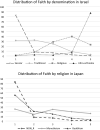Is stronger religious faith associated with a greater willingness to take the COVID-19 vaccine? Evidence from Israel and Japan
- PMID: 34677722
- PMCID: PMC8532098
- DOI: 10.1007/s10198-021-01389-8
Is stronger religious faith associated with a greater willingness to take the COVID-19 vaccine? Evidence from Israel and Japan
Abstract
Achieving high vaccination rates is important for overcoming an epidemic. This study investigates the association between religious faith and intentions to become vaccinated against COVID-19 in Israel and Japan. Most of Israel's population is monotheistic, whereas most Japanese are unaffiliated with any religion. Therefore, our findings might be applicable to various countries that differ in their religions and levels of religiosity. We conducted almost identical large-scale surveys four times in Israel and five times in Japan from March to June 2020 to obtain panel data. We found that intentions of getting vaccinated depend on people's level of religiosity in a non-linear way. Those who have strong religious beliefs are less likely to become vaccinated than those who say they are less religious. Two other factors that play a role in this relationship are religious denomination in Israel and identifying with a religion in Japan.
Keywords: COVID-19; Faith; HBM; Precaution measures; Religion; Religiosity; SARS-Cov-2; Vaccine; WTP.
© 2021. The Author(s), under exclusive licence to Springer-Verlag GmbH Germany, part of Springer Nature.
Figures
References
-
- Bar E, Lehrman Y, Mukhsan H. The need to narrow gaps in vaccinations against the new Corona virus (SARS-CoV2): the ultra-orthodox and Arab population. Harefuah. 2021;160(5):285–290.
-
- Barber BM, Odean T. Boys will be boys: gender, overconfidence, and common stock investment. Quart. J. Econ. 2001;116(1):261–292. doi: 10.1162/003355301556400. - DOI
-
- Bernat DH, Gerend MA, Chevallier K, Zimmerman MA, Bauermeister JA. Characteristics associated with initiation of the human papillomavirus vaccine among a national sample of male and female young adults. J. Adolesc. Health. 2013;53(5):630–636. doi: 10.1016/j.jadohealth.2013.07.035. - DOI - PMC - PubMed
MeSH terms
Substances
LinkOut - more resources
Full Text Sources
Medical
Miscellaneous


